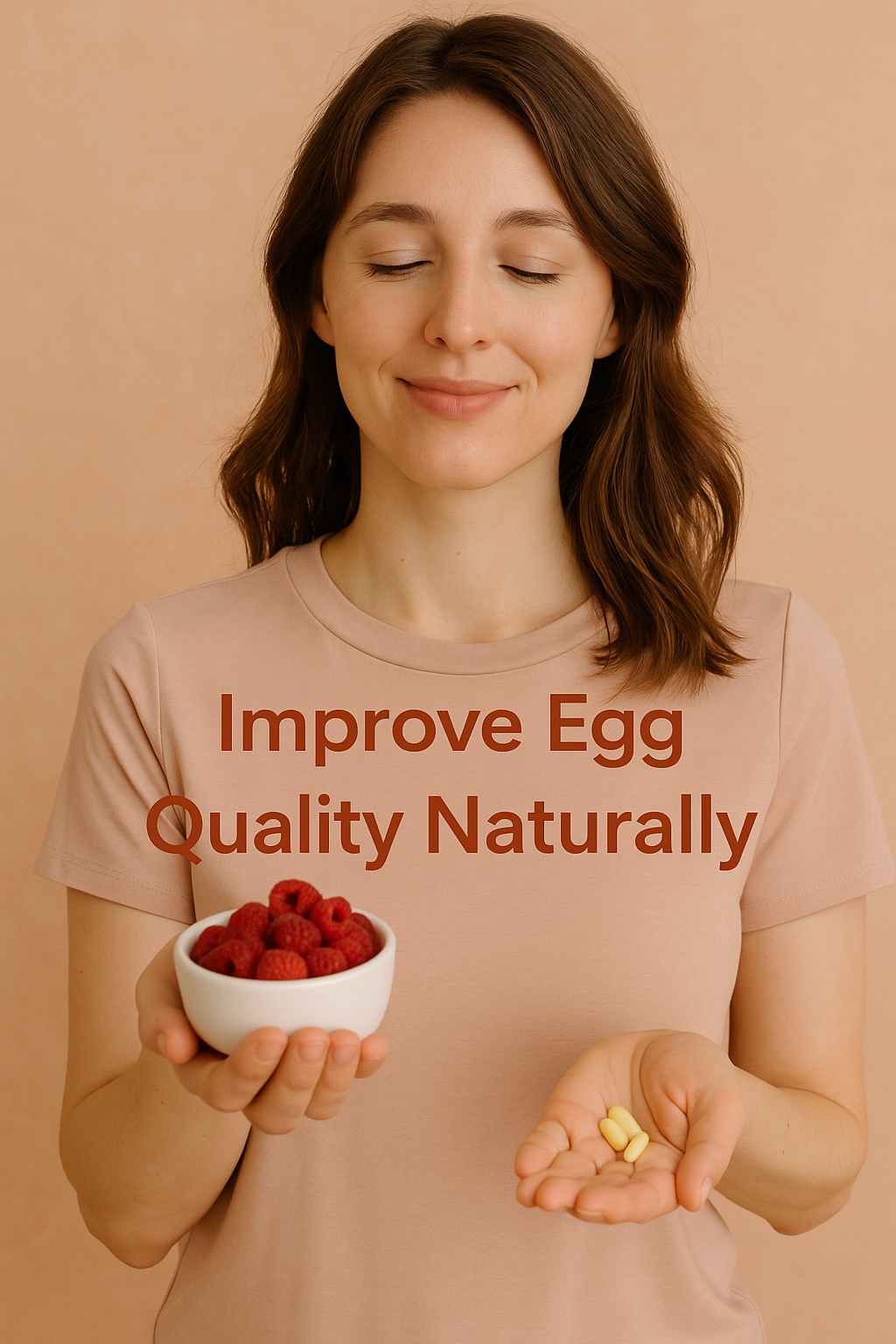Introduction: Why Egg Quality Matters
When trying to conceive, both egg quantity and quality play a vital role — but it’s egg quality that truly determines your chances of a healthy pregnancy.
As women age, especially after 30, egg quality can decline due to oxidative stress, hormonal imbalance, and nutrient depletion. The good news? Lifestyle, diet, and targeted supplements can significantly improve egg health over time.
🕒 Egg health takes roughly 90 days to improve — that’s how long it takes for an egg to mature before ovulation.
1. Eat Fertility-Boosting Foods
Nutrition is the foundation of reproductive health.
Focus on a Mediterranean-style fertility diet — rich in antioxidants, lean proteins, healthy fats, and whole grains.
✅ Top Egg-Quality Foods
-
Avocado & Nuts: High in vitamin E and monounsaturated fats that protect eggs from oxidative stress.
-
Berries: Blueberries and raspberries are antioxidant powerhouses.
-
Leafy Greens: Spinach, kale, and moringa provide folate and magnesium.
-
Eggs & Paneer: Provide choline and high-quality protein.
-
Seeds: Pumpkin, sunflower, and flaxseeds supply zinc and omega-3s.
2. Optimise Your Micronutrient Intake
Several vitamins and minerals are directly linked to better egg health.
| Nutrient | Role | Sources |
|---|---|---|
| CoQ10 | Improves mitochondrial function and energy in the egg | Supplements (100–200 mg/day) |
| Folic Acid | Prevents DNA damage | Leafy greens, supplements |
| Vitamin D | Supports hormone balance and ovarian health | Sunlight, supplements |
| Omega-3 (DHA) | Reduces inflammation | Flaxseed oil, algal oil |
| Zinc & Selenium | Aid egg maturation | Seeds, nuts, legumes |
| B12 & Iron | Support oxygen supply and hormone synthesis | Greek yoghurt, eggs, lentils |
3. Maintain a Healthy Weight
Both underweight and overweight women may experience ovulatory issues.
Aim for a balanced BMI (19–24) and focus on steady, sustainable weight management through clean eating and regular movement.
Even a 5–10 % reduction in excess body weight can improve ovulation and hormonal regularity.
4. Manage Stress Mindfully
Chronic stress can disrupt the delicate balance of reproductive hormones (FSH, LH, and progesterone).
Try:
-
Meditation or deep-breathing apps
-
Journaling or gratitude practice
-
Limiting screen time before bed
🧘♀️ A calm nervous system supports a fertile body.
5. Sleep Deeply and Regularly
Poor sleep impacts insulin and cortisol levels — both linked to lower fertility.
-
Target 7–8 hours nightly
-
Keep your bedroom dark and cool
-
Maintain a consistent sleep-wake cycle
6. Limit Toxins and Hormone Disruptors
Environmental toxins can interfere with egg development.
-
Choose organic produce when possible
-
Avoid plastics (especially BPA)
-
Skip non-stick pans and switch to stainless steel or cast iron
-
Reduce alcohol and quit smoking — both damage egg DNA
7. Time and Supplements Matter
Egg health renewal takes roughly three months, so consistency is key.
Talk to your doctor about supplements like:
-
CoQ10 (Ubiquinol form) – boosts egg energy
-
Vitamin D3 & Omega-3s – support cell membranes
-
Inositol – helpful in PCOS
-
Prenatal Multivitamin – ensures foundational nutrients
8. Supportive Ayurvedic and Holistic Add-Ons
Ancient wisdom can complement modern fertility care:
-
Ashwagandha: Reduces stress and balances hormones
-
Shatavari: Supports ovulation and uterine health
-
Triphala: Gentle detox and gut support
(Always consult your doctor before starting herbal supplements.)
Final Thoughts
Improving egg quality naturally isn’t an overnight fix — it’s a 90-day journey of nourishment, patience, and balance.
Focus on whole foods, mindful living, restorative sleep, and stress management — and let your body do the rest.
🌸 Your body is always ready to heal — you just need to give it the right environment.
Book a Personalised Fertility Nutrition Consultation
If you’re planning to conceive and want expert guidance, Dr. Akanksha Sharma (MD, Community Medicine) offers customized fertility and pre-pregnancy nutrition plans at https://atozofpregnancy.com/our-services/
These programs combine evidence-based nutrition, Ayurveda, and holistic fertility support for natural conception success.
#FertilityNutrition #ImproveEggQuality #HolisticFertility #PrePregnancyCare #AtoZofPregnancy #WomensHealth #NaturalFertility

Akanksha Sharma
Dr. Akanksha Sharma, Head Writer and creator of AtoZ of Pregnancy, is dedicated to empowering women, parents, and families through 360-degree knowledge. She and her team provide evidence-based advice to guide families through pregnancy, parenting and beyond.







Leave a Reply